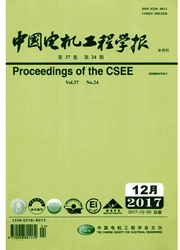

 中文摘要:
中文摘要:
以海泡石为载体制备生物质气化的碱金属催化剂,开展了低温水蒸气条件下的麦秸半焦催化气化试验。采用响应面设计法,进行3-level中心组合设计试验,构建半焦气化性能指标(氢气产率RH2、碳转化率XC、反应速率YC)与催化剂制备参数(K2CO3负载量、催化剂煅烧温度)的响应曲面,对半焦气化性能进行效应分析和优化。研究结果表明:K2CO3负载量对半焦气化反应的影响极显著;催化剂煅烧温度对氢气产率、碳转化率影响显著;二者对氢气产率、碳转化率还存在一定的交互效应。利用Design Expert软件优化,得到最佳的催化剂制备参数为:煅烧温度728 ℃、K2CO3负载量25.8%,在此优化条件下的试验结果显示RH2 = 103.67mol/kg、XC = 96.48%、YC = 1.28%/min,与模型预测值一致。气化温度对半焦气化有着重要的影响,低于700℃时,气化反应受到抑制,且试验表明海泡石是生物质低温气化制取富氢气体的一种合适的催化剂载体。
 英文摘要:
英文摘要:
The alkali metal catalysts with the sepiolite as support were prepared for biomass gasification. The gasification experiments of wheat straw char with steam were performed at a lower temperature (650~750℃). Based on response surface methodology, the designed experiments using 3-level experiment center composite were carried out. In order to evaluate the gasification performance of char involving the hydrogen yield, carbon conversion efficiency and reaction rate, the response surface was set up based on two catalyst preparation parameters, i.e. the K2CO3 content as well as calcination temperature. Using the regression model of the response surface, char gasification performance with the catalysts were analyzed and optimized. Results show that the char gasification performance is significantly influenced by the K2CO3 content, whereas the hydrogen yield and carbon conversion efficiency are much related to the calcination temperature. There is synergy between the K2CO3 content and calcination temperature on the hydrogen yield and carbon conversion efficiency. Further, the catalyst with a K2CO3 content of 25.8% and calcinated at a temperature of 728℃ is optimized. With the catalyst, the gasification of wheat straw char is experimentally performed at a temperature of 700℃. Results indicate that hydrogen yield of 103.67mol/kg, carbon conversion efficiency of 96.48% and reaction rate of 1.37min-1 are obtained at gasification temperature of 700℃, which is in good agreement with the model prediction. It is also found that gasification temperature has a significant effect on char conversion and the gasification reaction may be held back below the temperature of 700℃. And the results show that the sepiolite is a favorable catalyst support for biomass gasification.
 同期刊论文项目
同期刊论文项目
 同项目期刊论文
同项目期刊论文
 期刊信息
期刊信息
